Factors Influencing the Development of Early Education Sectors in UK
VerifiedAdded on 2023/04/22
|8
|2214
|172
Essay
AI Summary
This essay provides a comprehensive analysis of the development of early education sectors in the UK, exploring the historical, social, political, and cultural influences that have shaped this field. The essay traces the evolution of early childhood education from the mid-1700s, highlighting key milestones such as the establishment of monitorial schools and the impact of legislative acts like Foster's Education Act. It also examines the role of international organizations like UNICEF and ACEI in promoting and supporting early education initiatives. Furthermore, the essay delves into the impact of societal and community influences on children's learning, including the implementation of programs like EYEC. The essay also discusses the role of multiculturalism and cultural influences within homes and the broader environment, emphasizing the importance of inclusive practices. The conclusion summarizes the significant changes and developments in early education sectors, emphasizing the importance of a safe and secure future for social and cultural communities. The essay also references various studies and publications to support its arguments.
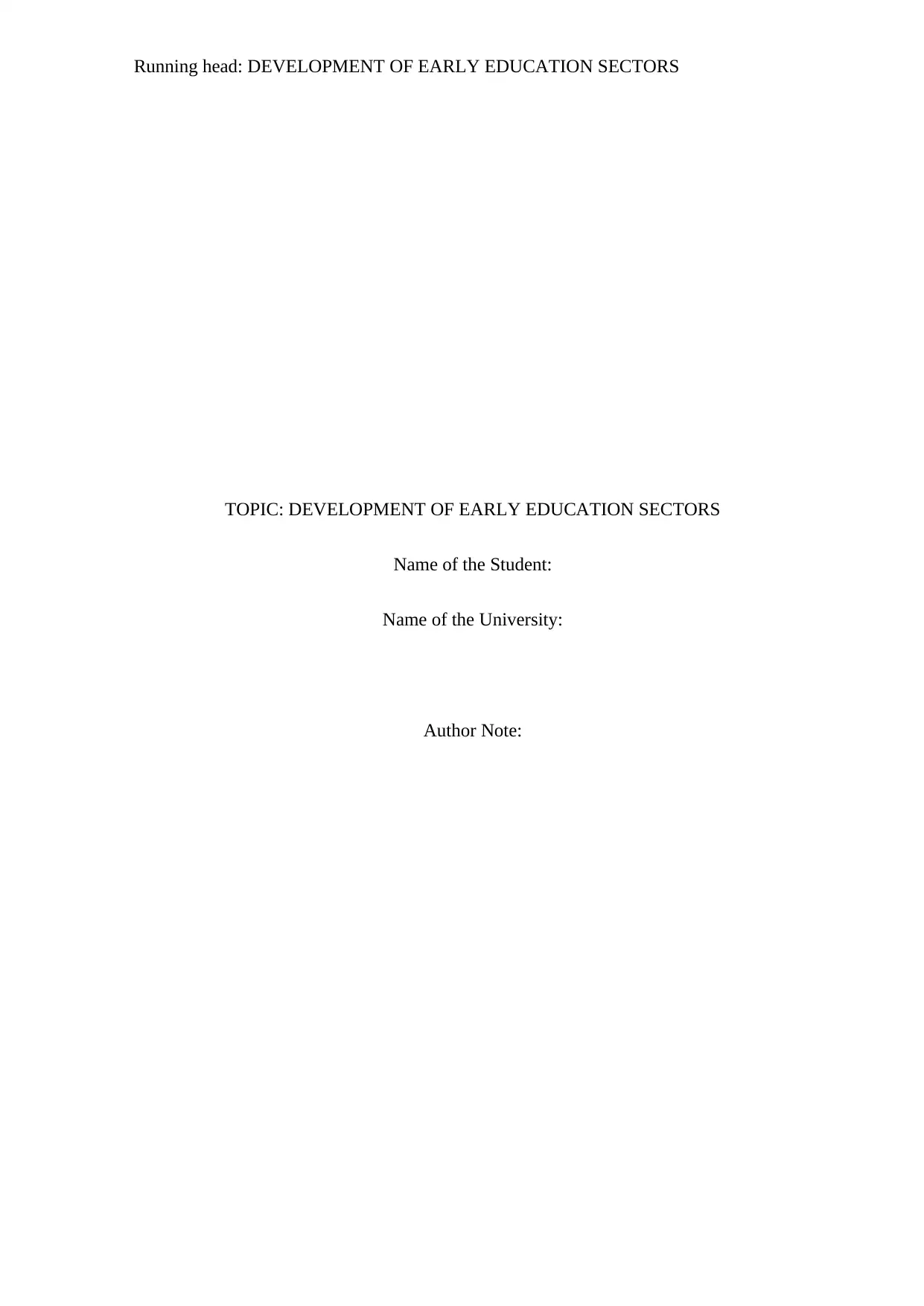
Running head: DEVELOPMENT OF EARLY EDUCATION SECTORS
TOPIC: DEVELOPMENT OF EARLY EDUCATION SECTORS
Name of the Student:
Name of the University:
Author Note:
TOPIC: DEVELOPMENT OF EARLY EDUCATION SECTORS
Name of the Student:
Name of the University:
Author Note:
Paraphrase This Document
Need a fresh take? Get an instant paraphrase of this document with our AI Paraphraser
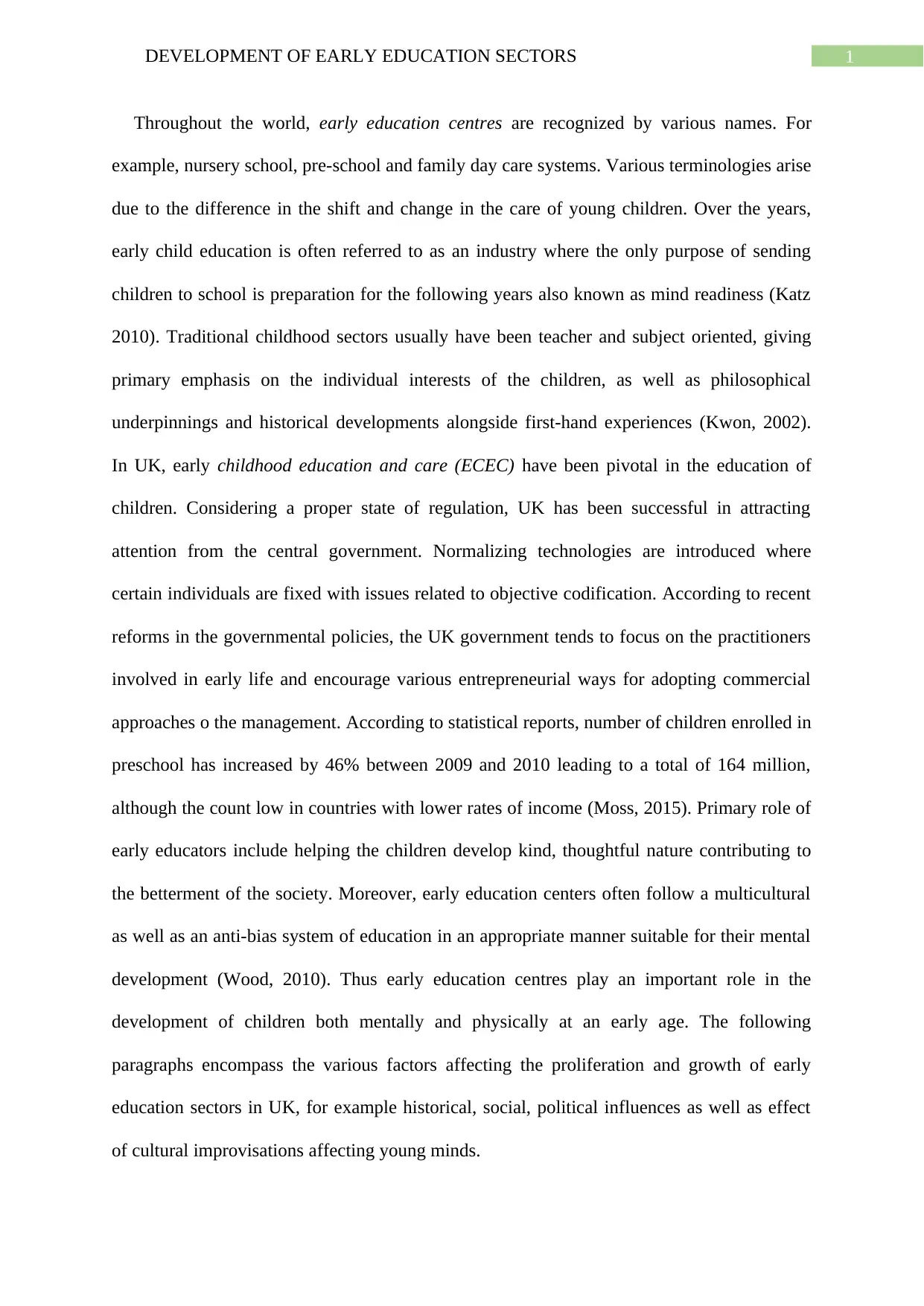
1DEVELOPMENT OF EARLY EDUCATION SECTORS
Throughout the world, early education centres are recognized by various names. For
example, nursery school, pre-school and family day care systems. Various terminologies arise
due to the difference in the shift and change in the care of young children. Over the years,
early child education is often referred to as an industry where the only purpose of sending
children to school is preparation for the following years also known as mind readiness (Katz
2010). Traditional childhood sectors usually have been teacher and subject oriented, giving
primary emphasis on the individual interests of the children, as well as philosophical
underpinnings and historical developments alongside first-hand experiences (Kwon, 2002).
In UK, early childhood education and care (ECEC) have been pivotal in the education of
children. Considering a proper state of regulation, UK has been successful in attracting
attention from the central government. Normalizing technologies are introduced where
certain individuals are fixed with issues related to objective codification. According to recent
reforms in the governmental policies, the UK government tends to focus on the practitioners
involved in early life and encourage various entrepreneurial ways for adopting commercial
approaches o the management. According to statistical reports, number of children enrolled in
preschool has increased by 46% between 2009 and 2010 leading to a total of 164 million,
although the count low in countries with lower rates of income (Moss, 2015). Primary role of
early educators include helping the children develop kind, thoughtful nature contributing to
the betterment of the society. Moreover, early education centers often follow a multicultural
as well as an anti-bias system of education in an appropriate manner suitable for their mental
development (Wood, 2010). Thus early education centres play an important role in the
development of children both mentally and physically at an early age. The following
paragraphs encompass the various factors affecting the proliferation and growth of early
education sectors in UK, for example historical, social, political influences as well as effect
of cultural improvisations affecting young minds.
Throughout the world, early education centres are recognized by various names. For
example, nursery school, pre-school and family day care systems. Various terminologies arise
due to the difference in the shift and change in the care of young children. Over the years,
early child education is often referred to as an industry where the only purpose of sending
children to school is preparation for the following years also known as mind readiness (Katz
2010). Traditional childhood sectors usually have been teacher and subject oriented, giving
primary emphasis on the individual interests of the children, as well as philosophical
underpinnings and historical developments alongside first-hand experiences (Kwon, 2002).
In UK, early childhood education and care (ECEC) have been pivotal in the education of
children. Considering a proper state of regulation, UK has been successful in attracting
attention from the central government. Normalizing technologies are introduced where
certain individuals are fixed with issues related to objective codification. According to recent
reforms in the governmental policies, the UK government tends to focus on the practitioners
involved in early life and encourage various entrepreneurial ways for adopting commercial
approaches o the management. According to statistical reports, number of children enrolled in
preschool has increased by 46% between 2009 and 2010 leading to a total of 164 million,
although the count low in countries with lower rates of income (Moss, 2015). Primary role of
early educators include helping the children develop kind, thoughtful nature contributing to
the betterment of the society. Moreover, early education centers often follow a multicultural
as well as an anti-bias system of education in an appropriate manner suitable for their mental
development (Wood, 2010). Thus early education centres play an important role in the
development of children both mentally and physically at an early age. The following
paragraphs encompass the various factors affecting the proliferation and growth of early
education sectors in UK, for example historical, social, political influences as well as effect
of cultural improvisations affecting young minds.
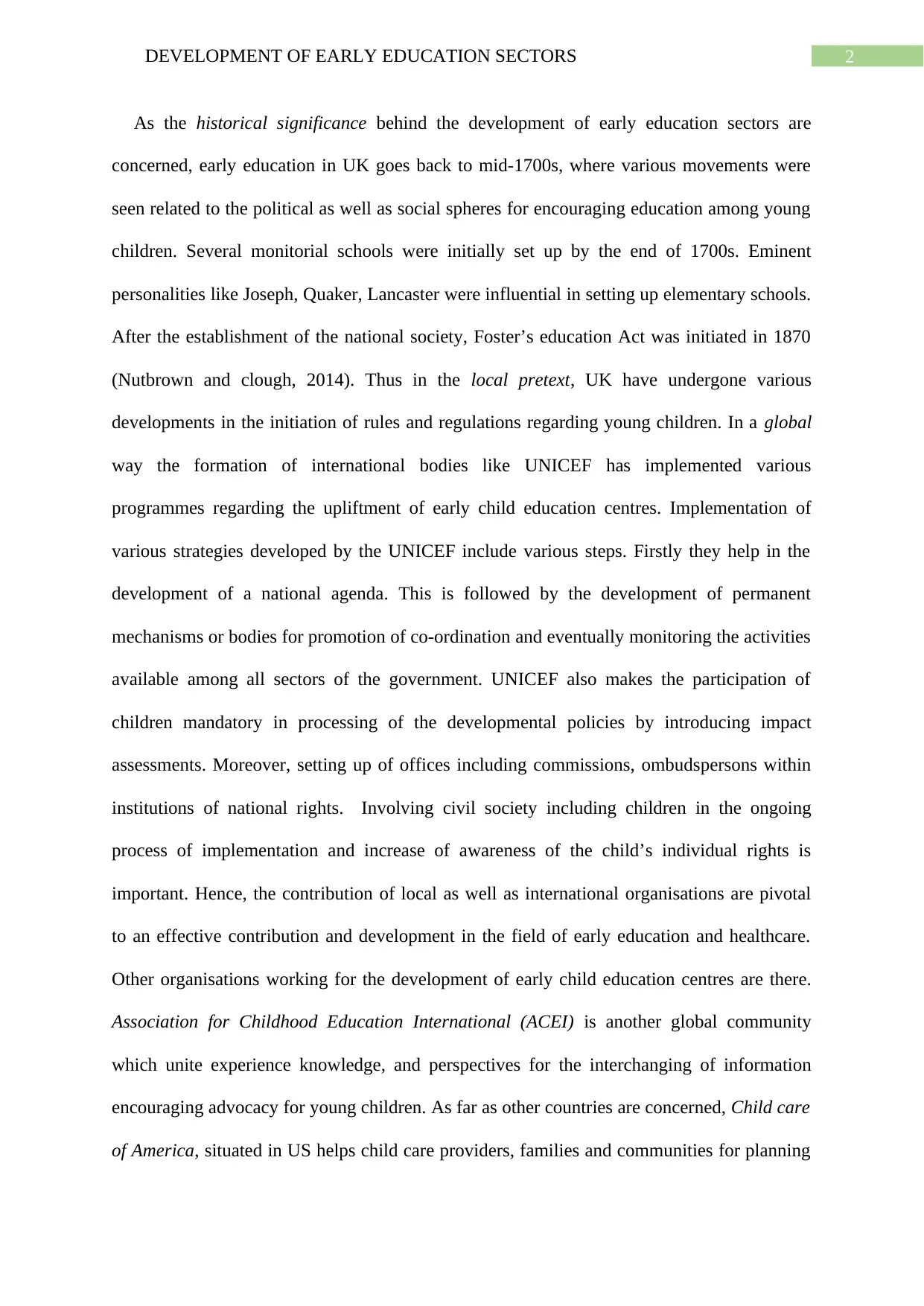
2DEVELOPMENT OF EARLY EDUCATION SECTORS
As the historical significance behind the development of early education sectors are
concerned, early education in UK goes back to mid-1700s, where various movements were
seen related to the political as well as social spheres for encouraging education among young
children. Several monitorial schools were initially set up by the end of 1700s. Eminent
personalities like Joseph, Quaker, Lancaster were influential in setting up elementary schools.
After the establishment of the national society, Foster’s education Act was initiated in 1870
(Nutbrown and clough, 2014). Thus in the local pretext, UK have undergone various
developments in the initiation of rules and regulations regarding young children. In a global
way the formation of international bodies like UNICEF has implemented various
programmes regarding the upliftment of early child education centres. Implementation of
various strategies developed by the UNICEF include various steps. Firstly they help in the
development of a national agenda. This is followed by the development of permanent
mechanisms or bodies for promotion of co-ordination and eventually monitoring the activities
available among all sectors of the government. UNICEF also makes the participation of
children mandatory in processing of the developmental policies by introducing impact
assessments. Moreover, setting up of offices including commissions, ombudspersons within
institutions of national rights. Involving civil society including children in the ongoing
process of implementation and increase of awareness of the child’s individual rights is
important. Hence, the contribution of local as well as international organisations are pivotal
to an effective contribution and development in the field of early education and healthcare.
Other organisations working for the development of early child education centres are there.
Association for Childhood Education International (ACEI) is another global community
which unite experience knowledge, and perspectives for the interchanging of information
encouraging advocacy for young children. As far as other countries are concerned, Child care
of America, situated in US helps child care providers, families and communities for planning
As the historical significance behind the development of early education sectors are
concerned, early education in UK goes back to mid-1700s, where various movements were
seen related to the political as well as social spheres for encouraging education among young
children. Several monitorial schools were initially set up by the end of 1700s. Eminent
personalities like Joseph, Quaker, Lancaster were influential in setting up elementary schools.
After the establishment of the national society, Foster’s education Act was initiated in 1870
(Nutbrown and clough, 2014). Thus in the local pretext, UK have undergone various
developments in the initiation of rules and regulations regarding young children. In a global
way the formation of international bodies like UNICEF has implemented various
programmes regarding the upliftment of early child education centres. Implementation of
various strategies developed by the UNICEF include various steps. Firstly they help in the
development of a national agenda. This is followed by the development of permanent
mechanisms or bodies for promotion of co-ordination and eventually monitoring the activities
available among all sectors of the government. UNICEF also makes the participation of
children mandatory in processing of the developmental policies by introducing impact
assessments. Moreover, setting up of offices including commissions, ombudspersons within
institutions of national rights. Involving civil society including children in the ongoing
process of implementation and increase of awareness of the child’s individual rights is
important. Hence, the contribution of local as well as international organisations are pivotal
to an effective contribution and development in the field of early education and healthcare.
Other organisations working for the development of early child education centres are there.
Association for Childhood Education International (ACEI) is another global community
which unite experience knowledge, and perspectives for the interchanging of information
encouraging advocacy for young children. As far as other countries are concerned, Child care
of America, situated in US helps child care providers, families and communities for planning
⊘ This is a preview!⊘
Do you want full access?
Subscribe today to unlock all pages.

Trusted by 1+ million students worldwide
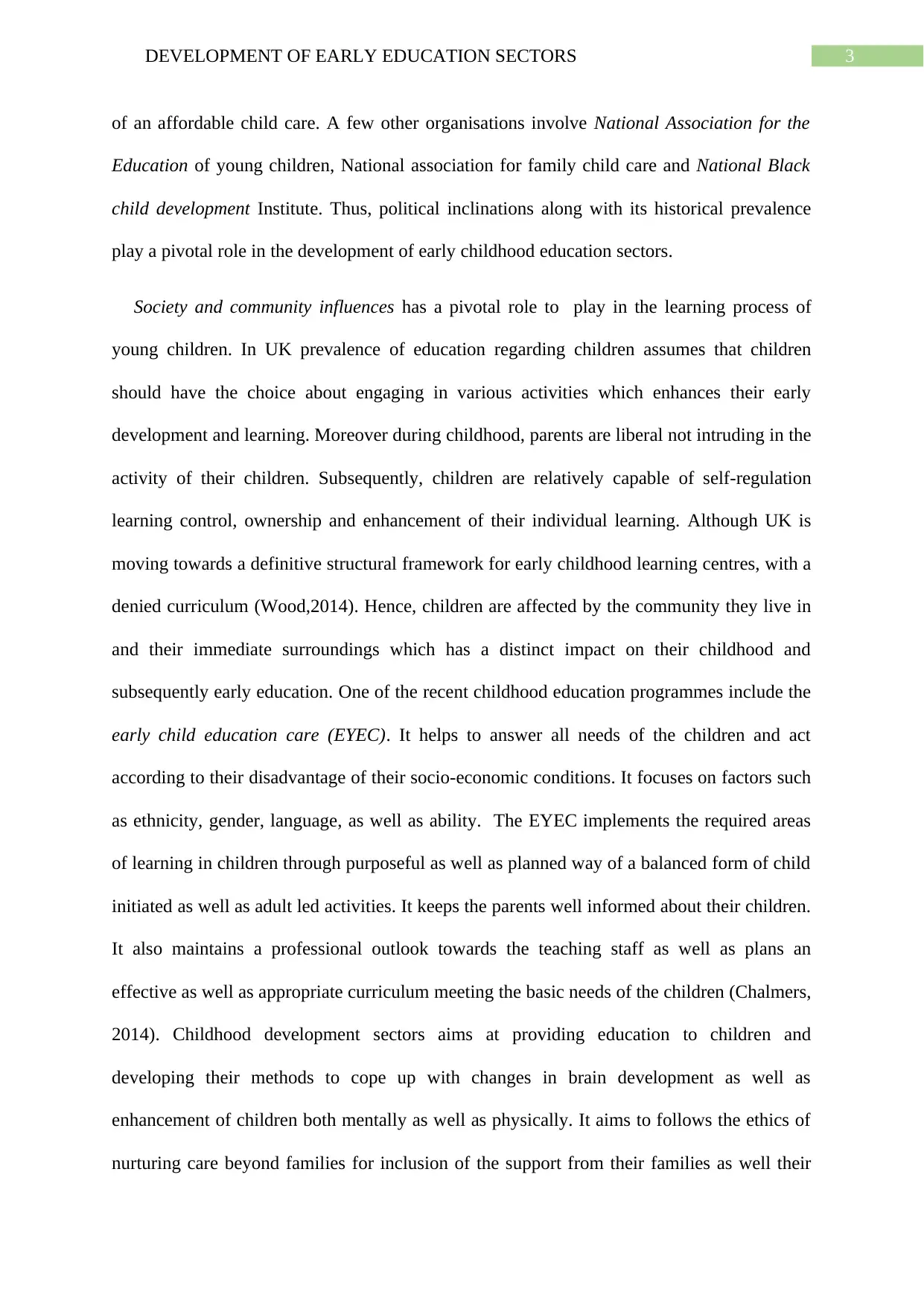
3DEVELOPMENT OF EARLY EDUCATION SECTORS
of an affordable child care. A few other organisations involve National Association for the
Education of young children, National association for family child care and National Black
child development Institute. Thus, political inclinations along with its historical prevalence
play a pivotal role in the development of early childhood education sectors.
Society and community influences has a pivotal role to play in the learning process of
young children. In UK prevalence of education regarding children assumes that children
should have the choice about engaging in various activities which enhances their early
development and learning. Moreover during childhood, parents are liberal not intruding in the
activity of their children. Subsequently, children are relatively capable of self-regulation
learning control, ownership and enhancement of their individual learning. Although UK is
moving towards a definitive structural framework for early childhood learning centres, with a
denied curriculum (Wood,2014). Hence, children are affected by the community they live in
and their immediate surroundings which has a distinct impact on their childhood and
subsequently early education. One of the recent childhood education programmes include the
early child education care (EYEC). It helps to answer all needs of the children and act
according to their disadvantage of their socio-economic conditions. It focuses on factors such
as ethnicity, gender, language, as well as ability. The EYEC implements the required areas
of learning in children through purposeful as well as planned way of a balanced form of child
initiated as well as adult led activities. It keeps the parents well informed about their children.
It also maintains a professional outlook towards the teaching staff as well as plans an
effective as well as appropriate curriculum meeting the basic needs of the children (Chalmers,
2014). Childhood development sectors aims at providing education to children and
developing their methods to cope up with changes in brain development as well as
enhancement of children both mentally as well as physically. It aims to follows the ethics of
nurturing care beyond families for inclusion of the support from their families as well their
of an affordable child care. A few other organisations involve National Association for the
Education of young children, National association for family child care and National Black
child development Institute. Thus, political inclinations along with its historical prevalence
play a pivotal role in the development of early childhood education sectors.
Society and community influences has a pivotal role to play in the learning process of
young children. In UK prevalence of education regarding children assumes that children
should have the choice about engaging in various activities which enhances their early
development and learning. Moreover during childhood, parents are liberal not intruding in the
activity of their children. Subsequently, children are relatively capable of self-regulation
learning control, ownership and enhancement of their individual learning. Although UK is
moving towards a definitive structural framework for early childhood learning centres, with a
denied curriculum (Wood,2014). Hence, children are affected by the community they live in
and their immediate surroundings which has a distinct impact on their childhood and
subsequently early education. One of the recent childhood education programmes include the
early child education care (EYEC). It helps to answer all needs of the children and act
according to their disadvantage of their socio-economic conditions. It focuses on factors such
as ethnicity, gender, language, as well as ability. The EYEC implements the required areas
of learning in children through purposeful as well as planned way of a balanced form of child
initiated as well as adult led activities. It keeps the parents well informed about their children.
It also maintains a professional outlook towards the teaching staff as well as plans an
effective as well as appropriate curriculum meeting the basic needs of the children (Chalmers,
2014). Childhood development sectors aims at providing education to children and
developing their methods to cope up with changes in brain development as well as
enhancement of children both mentally as well as physically. It aims to follows the ethics of
nurturing care beyond families for inclusion of the support from their families as well their
Paraphrase This Document
Need a fresh take? Get an instant paraphrase of this document with our AI Paraphraser
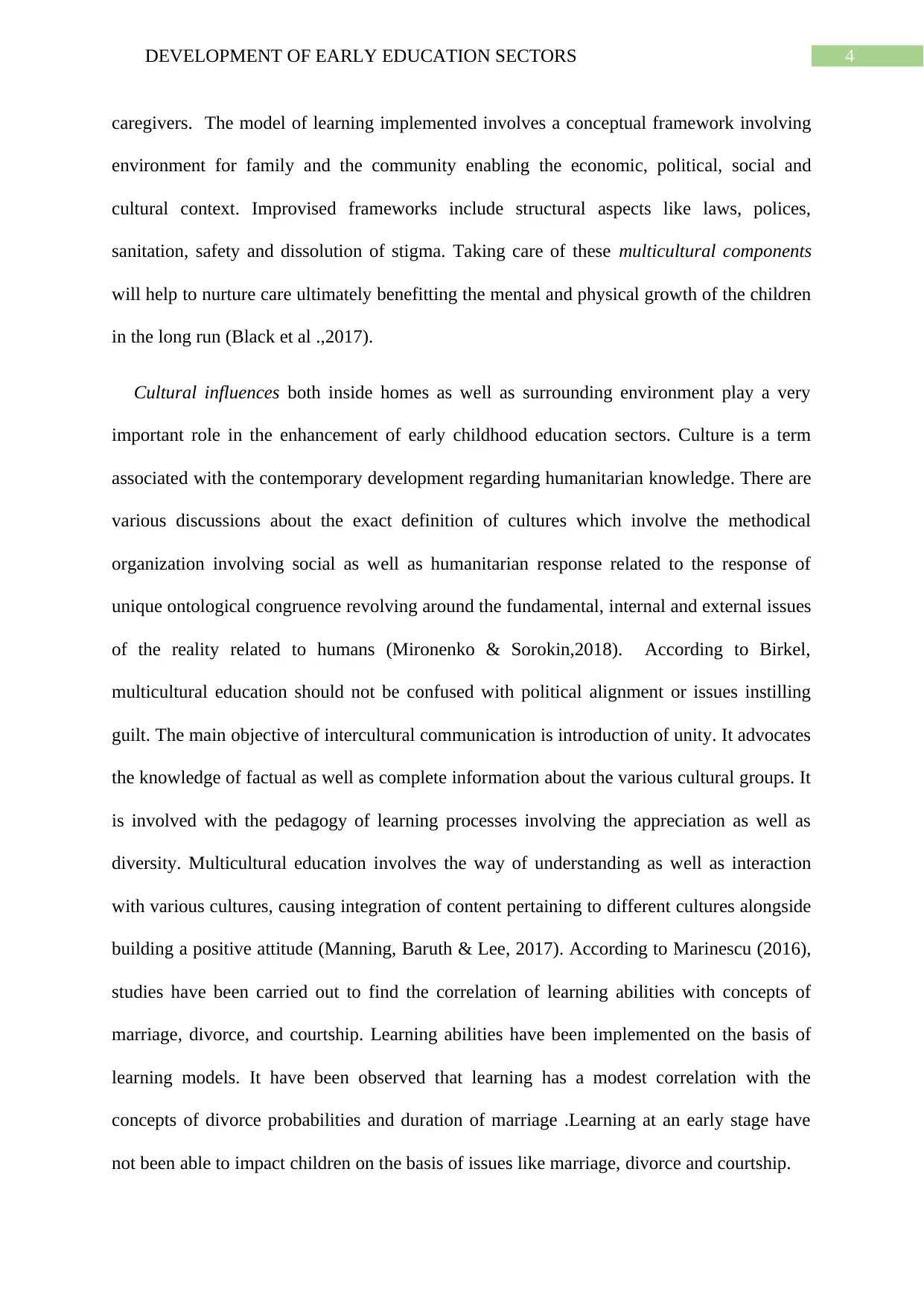
4DEVELOPMENT OF EARLY EDUCATION SECTORS
caregivers. The model of learning implemented involves a conceptual framework involving
environment for family and the community enabling the economic, political, social and
cultural context. Improvised frameworks include structural aspects like laws, polices,
sanitation, safety and dissolution of stigma. Taking care of these multicultural components
will help to nurture care ultimately benefitting the mental and physical growth of the children
in the long run (Black et al .,2017).
Cultural influences both inside homes as well as surrounding environment play a very
important role in the enhancement of early childhood education sectors. Culture is a term
associated with the contemporary development regarding humanitarian knowledge. There are
various discussions about the exact definition of cultures which involve the methodical
organization involving social as well as humanitarian response related to the response of
unique ontological congruence revolving around the fundamental, internal and external issues
of the reality related to humans (Mironenko & Sorokin,2018). According to Birkel,
multicultural education should not be confused with political alignment or issues instilling
guilt. The main objective of intercultural communication is introduction of unity. It advocates
the knowledge of factual as well as complete information about the various cultural groups. It
is involved with the pedagogy of learning processes involving the appreciation as well as
diversity. Multicultural education involves the way of understanding as well as interaction
with various cultures, causing integration of content pertaining to different cultures alongside
building a positive attitude (Manning, Baruth & Lee, 2017). According to Marinescu (2016),
studies have been carried out to find the correlation of learning abilities with concepts of
marriage, divorce, and courtship. Learning abilities have been implemented on the basis of
learning models. It have been observed that learning has a modest correlation with the
concepts of divorce probabilities and duration of marriage .Learning at an early stage have
not been able to impact children on the basis of issues like marriage, divorce and courtship.
caregivers. The model of learning implemented involves a conceptual framework involving
environment for family and the community enabling the economic, political, social and
cultural context. Improvised frameworks include structural aspects like laws, polices,
sanitation, safety and dissolution of stigma. Taking care of these multicultural components
will help to nurture care ultimately benefitting the mental and physical growth of the children
in the long run (Black et al .,2017).
Cultural influences both inside homes as well as surrounding environment play a very
important role in the enhancement of early childhood education sectors. Culture is a term
associated with the contemporary development regarding humanitarian knowledge. There are
various discussions about the exact definition of cultures which involve the methodical
organization involving social as well as humanitarian response related to the response of
unique ontological congruence revolving around the fundamental, internal and external issues
of the reality related to humans (Mironenko & Sorokin,2018). According to Birkel,
multicultural education should not be confused with political alignment or issues instilling
guilt. The main objective of intercultural communication is introduction of unity. It advocates
the knowledge of factual as well as complete information about the various cultural groups. It
is involved with the pedagogy of learning processes involving the appreciation as well as
diversity. Multicultural education involves the way of understanding as well as interaction
with various cultures, causing integration of content pertaining to different cultures alongside
building a positive attitude (Manning, Baruth & Lee, 2017). According to Marinescu (2016),
studies have been carried out to find the correlation of learning abilities with concepts of
marriage, divorce, and courtship. Learning abilities have been implemented on the basis of
learning models. It have been observed that learning has a modest correlation with the
concepts of divorce probabilities and duration of marriage .Learning at an early stage have
not been able to impact children on the basis of issues like marriage, divorce and courtship.
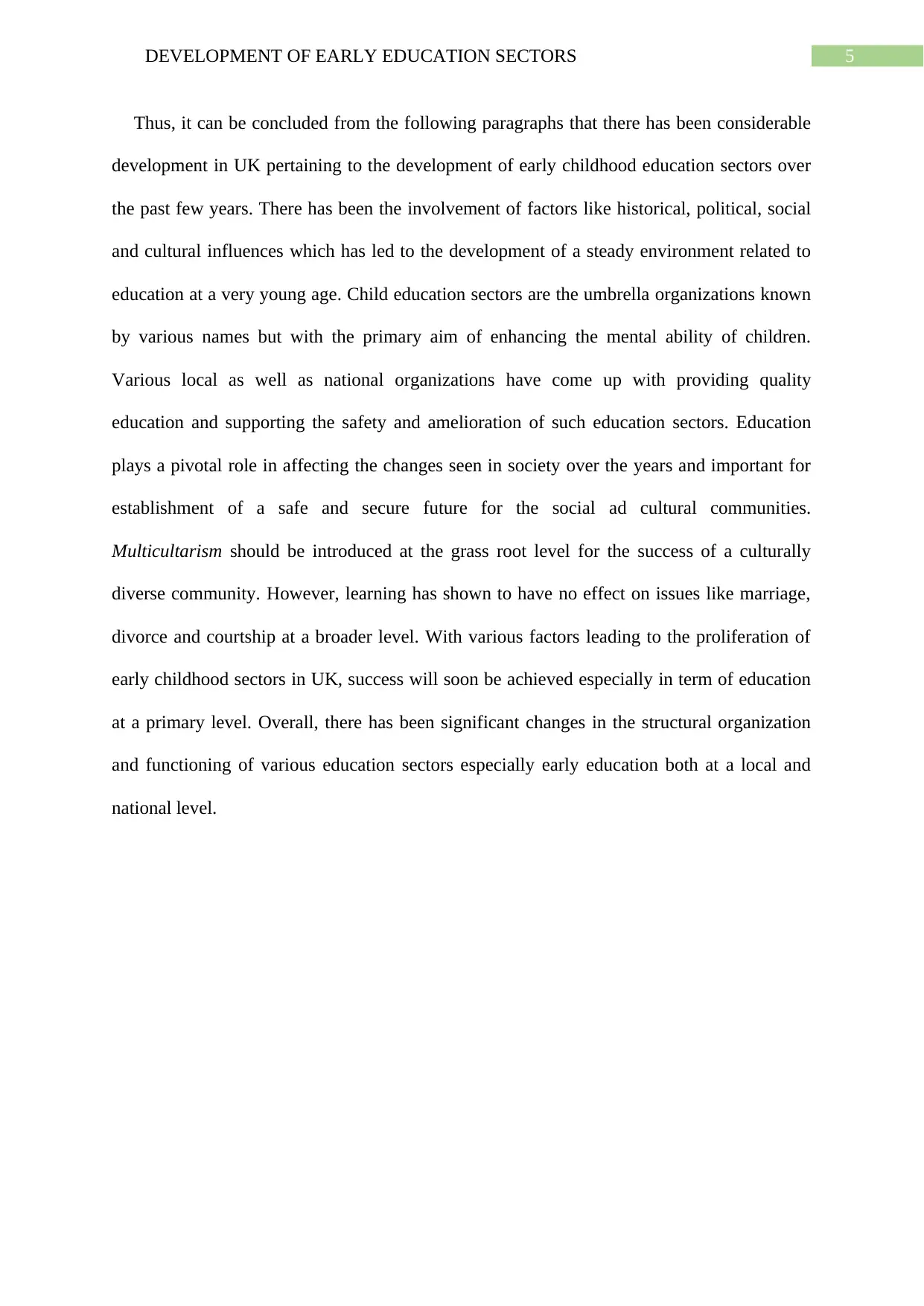
5DEVELOPMENT OF EARLY EDUCATION SECTORS
Thus, it can be concluded from the following paragraphs that there has been considerable
development in UK pertaining to the development of early childhood education sectors over
the past few years. There has been the involvement of factors like historical, political, social
and cultural influences which has led to the development of a steady environment related to
education at a very young age. Child education sectors are the umbrella organizations known
by various names but with the primary aim of enhancing the mental ability of children.
Various local as well as national organizations have come up with providing quality
education and supporting the safety and amelioration of such education sectors. Education
plays a pivotal role in affecting the changes seen in society over the years and important for
establishment of a safe and secure future for the social ad cultural communities.
Multicultarism should be introduced at the grass root level for the success of a culturally
diverse community. However, learning has shown to have no effect on issues like marriage,
divorce and courtship at a broader level. With various factors leading to the proliferation of
early childhood sectors in UK, success will soon be achieved especially in term of education
at a primary level. Overall, there has been significant changes in the structural organization
and functioning of various education sectors especially early education both at a local and
national level.
Thus, it can be concluded from the following paragraphs that there has been considerable
development in UK pertaining to the development of early childhood education sectors over
the past few years. There has been the involvement of factors like historical, political, social
and cultural influences which has led to the development of a steady environment related to
education at a very young age. Child education sectors are the umbrella organizations known
by various names but with the primary aim of enhancing the mental ability of children.
Various local as well as national organizations have come up with providing quality
education and supporting the safety and amelioration of such education sectors. Education
plays a pivotal role in affecting the changes seen in society over the years and important for
establishment of a safe and secure future for the social ad cultural communities.
Multicultarism should be introduced at the grass root level for the success of a culturally
diverse community. However, learning has shown to have no effect on issues like marriage,
divorce and courtship at a broader level. With various factors leading to the proliferation of
early childhood sectors in UK, success will soon be achieved especially in term of education
at a primary level. Overall, there has been significant changes in the structural organization
and functioning of various education sectors especially early education both at a local and
national level.
⊘ This is a preview!⊘
Do you want full access?
Subscribe today to unlock all pages.

Trusted by 1+ million students worldwide
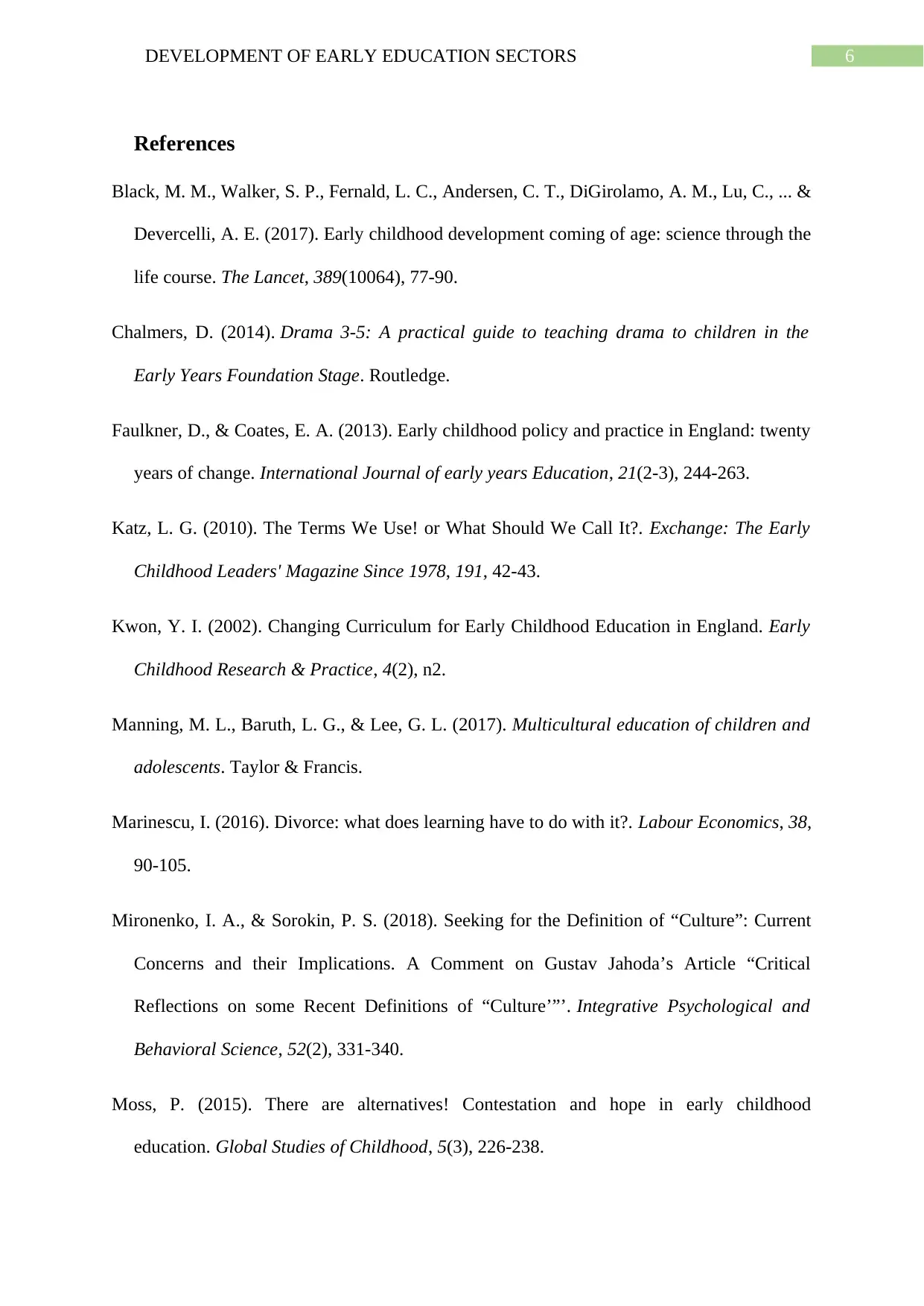
6DEVELOPMENT OF EARLY EDUCATION SECTORS
References
Black, M. M., Walker, S. P., Fernald, L. C., Andersen, C. T., DiGirolamo, A. M., Lu, C., ... &
Devercelli, A. E. (2017). Early childhood development coming of age: science through the
life course. The Lancet, 389(10064), 77-90.
Chalmers, D. (2014). Drama 3-5: A practical guide to teaching drama to children in the
Early Years Foundation Stage. Routledge.
Faulkner, D., & Coates, E. A. (2013). Early childhood policy and practice in England: twenty
years of change. International Journal of early years Education, 21(2-3), 244-263.
Katz, L. G. (2010). The Terms We Use! or What Should We Call It?. Exchange: The Early
Childhood Leaders' Magazine Since 1978, 191, 42-43.
Kwon, Y. I. (2002). Changing Curriculum for Early Childhood Education in England. Early
Childhood Research & Practice, 4(2), n2.
Manning, M. L., Baruth, L. G., & Lee, G. L. (2017). Multicultural education of children and
adolescents. Taylor & Francis.
Marinescu, I. (2016). Divorce: what does learning have to do with it?. Labour Economics, 38,
90-105.
Mironenko, I. A., & Sorokin, P. S. (2018). Seeking for the Definition of “Culture”: Current
Concerns and their Implications. A Comment on Gustav Jahoda’s Article “Critical
Reflections on some Recent Definitions of “Culture’”’. Integrative Psychological and
Behavioral Science, 52(2), 331-340.
Moss, P. (2015). There are alternatives! Contestation and hope in early childhood
education. Global Studies of Childhood, 5(3), 226-238.
References
Black, M. M., Walker, S. P., Fernald, L. C., Andersen, C. T., DiGirolamo, A. M., Lu, C., ... &
Devercelli, A. E. (2017). Early childhood development coming of age: science through the
life course. The Lancet, 389(10064), 77-90.
Chalmers, D. (2014). Drama 3-5: A practical guide to teaching drama to children in the
Early Years Foundation Stage. Routledge.
Faulkner, D., & Coates, E. A. (2013). Early childhood policy and practice in England: twenty
years of change. International Journal of early years Education, 21(2-3), 244-263.
Katz, L. G. (2010). The Terms We Use! or What Should We Call It?. Exchange: The Early
Childhood Leaders' Magazine Since 1978, 191, 42-43.
Kwon, Y. I. (2002). Changing Curriculum for Early Childhood Education in England. Early
Childhood Research & Practice, 4(2), n2.
Manning, M. L., Baruth, L. G., & Lee, G. L. (2017). Multicultural education of children and
adolescents. Taylor & Francis.
Marinescu, I. (2016). Divorce: what does learning have to do with it?. Labour Economics, 38,
90-105.
Mironenko, I. A., & Sorokin, P. S. (2018). Seeking for the Definition of “Culture”: Current
Concerns and their Implications. A Comment on Gustav Jahoda’s Article “Critical
Reflections on some Recent Definitions of “Culture’”’. Integrative Psychological and
Behavioral Science, 52(2), 331-340.
Moss, P. (2015). There are alternatives! Contestation and hope in early childhood
education. Global Studies of Childhood, 5(3), 226-238.
Paraphrase This Document
Need a fresh take? Get an instant paraphrase of this document with our AI Paraphraser
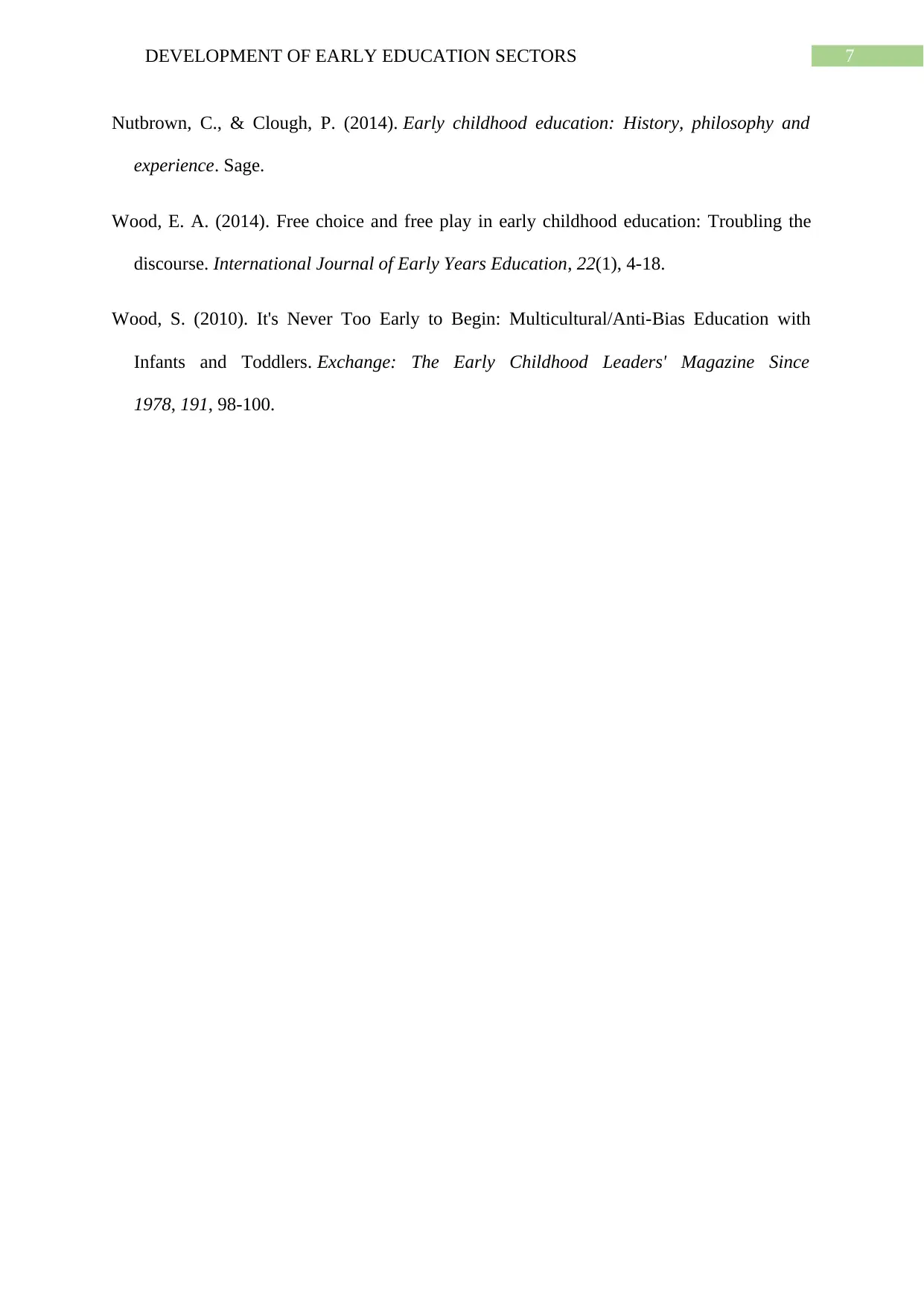
7DEVELOPMENT OF EARLY EDUCATION SECTORS
Nutbrown, C., & Clough, P. (2014). Early childhood education: History, philosophy and
experience. Sage.
Wood, E. A. (2014). Free choice and free play in early childhood education: Troubling the
discourse. International Journal of Early Years Education, 22(1), 4-18.
Wood, S. (2010). It's Never Too Early to Begin: Multicultural/Anti-Bias Education with
Infants and Toddlers. Exchange: The Early Childhood Leaders' Magazine Since
1978, 191, 98-100.
Nutbrown, C., & Clough, P. (2014). Early childhood education: History, philosophy and
experience. Sage.
Wood, E. A. (2014). Free choice and free play in early childhood education: Troubling the
discourse. International Journal of Early Years Education, 22(1), 4-18.
Wood, S. (2010). It's Never Too Early to Begin: Multicultural/Anti-Bias Education with
Infants and Toddlers. Exchange: The Early Childhood Leaders' Magazine Since
1978, 191, 98-100.
1 out of 8
Related Documents
Your All-in-One AI-Powered Toolkit for Academic Success.
+13062052269
info@desklib.com
Available 24*7 on WhatsApp / Email
![[object Object]](/_next/static/media/star-bottom.7253800d.svg)
Unlock your academic potential
Copyright © 2020–2026 A2Z Services. All Rights Reserved. Developed and managed by ZUCOL.




